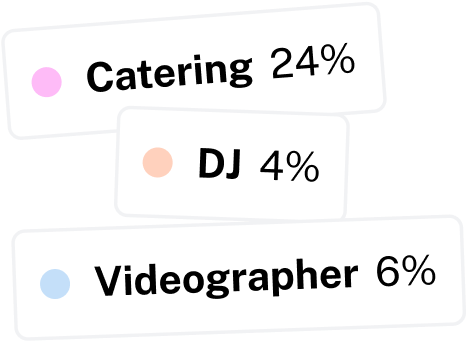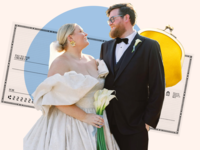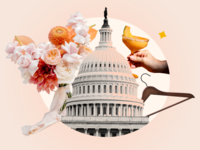More Couples Than You Think Go Over Their Wedding Budget (and Here's How Much They Overspend)

Coming up with the right wedding budget for you isn't always the easiest or most glamorous part of the planning process—but sticking to your number is a whole other ball game. How are you realistically supposed to anticipate every little wedding expense that bubbles up (seemingly out of thin air) as you're hiring vendors and making purchases on your way to "I do"? After polling nearly 17,000 U.S. couples for The Knot Real Weddings Study, we discovered that couples who spend more on their wedding are actually more common than you would think.
In this article:
- How Many Couples Go Over Their Wedding Budget and by How Much?
- How to Prevent Going Over Your Wedding Budget Before Planning
- Considerations When Setting Your Wedding Budget in 2024
How Many Couples Go Over Their Wedding Budget and by How Much?
First of all, if you find that your wedding is over budget, please don't beat yourself up. You're far from the first couple to spend more on their wedding. But, exactly, how many people go over their budget for a wedding ceremony? According to The Knot Real Weddings Study, 53% of couples spent more than they'd planned by an average of $7,347. Some high spenders even blew past their already lofty limits by over $10,000. While some of this may have to do with inflation (63% of couples said their budget was impacted by the economy), a wedding over budget is nothing new.
How to Prevent Going Over Your Wedding Budget Before Planning
So, how can you plan your wedding without going over budget? These days, when it comes to sticking to a budget during the wedding planning process, flexibility is key. If you're just starting to plan your wedding day, the tips below can help you save money and avoid overspending right from the get-go:
Set your budget before doing anything else.
Before starting to research vendors, it's essential to figure out how much you can spend on your wedding. Sit down with any family members who may be contributing and figure out the total lump sum you can spend. Then, head over to The Knot Budget Advisor to explore vendor price estimates near your wedding location. While the average cost of a wedding is around $33,000 (meaning that, on average, how much a wedding costs over budget is around $40,000), it varies widely based on where you're getting married, guest count, etc.
Give yourself plenty of time to plan.
While sometimes short planning timelines can't be avoided, if you're able to give yourself at least a year to plan your big day, you may reap certain benefits. If you're running on a short timeline, you might incur additional rush fees and other charges that can put you into over-budget territory.
Choose a date that's in the off-season or on a weekday.
Some wedding venues and vendors may offer discounts if you're marrying during the off-season (winter, in most parts of the country), or on a weekday. And because of the current wedding boom, we anticipate that weekday weddings and morning weddings (hello, brunch!) will be trending this year anyway.
Hire a wedding planner.
Yes, a wedding planner is an additional expense, but one that can save you money in the long run. Planners know the industry inside and out and will make sure you hire vendors that will fit your budget and help you avoid overspending.
Invite fewer wedding guests.
The higher the guest count, the more you'll spend. According to our study, the average wedding cost for events with 50 guests or fewer was $15,000, while the average cost for weddings with over 100 guests was $42,000—big difference.
Keep your wedding party tight.
While it can be fun to have a huge wedding party, keeping your crew small can mean big cost savings. Bridesmaid hair and makeup, gifts and other expenses can add up quickly.
Trust your wedding vendors.
Because of inflation, certain products and services may be costing more than before. This is particularly true with wedding flowers. So instead of focusing on a particular type of costly bloom for your bouquet, trust your florist to find a beautiful array of flowers that fit your color scheme—and your budget. The same goes with food, invitations, decorations and more.
Remember hidden fees.
Make room in your budget for often-forgotten wedding costs, like gratuities, postage and marriage license fees. An experienced wedding planner can help you account for these extra charges.
Plan ahead.
Even with all of these money-saving tips, overspending is common enough that we recommend actually planning to do so while making your overall budget. It's kind of a genius way to beat the system when you think about it: By accounting for extra splurges and line items (like weather backup plans, hidden costs, overtime fees, miscellaneous emergencies), you allow yourself a little wiggle room and won't technically end up overspending on your big day. One way to do this is by reserving 5% of your total wedding budget as a "just in case" fund that you can dip into when additional expenses arise.
Considerations When Setting Your Wedding Budget in 2025
For couples planning their wedding in 2025 and into 2026, it's clear that the economy is affecting costs and budgets. According to our study, 75% of couples say that the economy has already impacted their wedding planning, with an additional 14% predicting it may in the future. Additionally, two out of three couples say that planning a budget is the biggest challenge, and nearly half say that inflation is another top concern.
So, what can couples planning a wedding do? Well, as we've mentioned, setting a budget early in the process is important, but sticking to it can be difficult, especially in this economic climate. Our study showed that 57% of couples increased their budget at least once during the planning process. If you have some wiggle room with your budget, great, but if not, you'll need to be willing to make trade-offs between splurging and saving.
We also learned among that group that 53% of couples are being more selective about their "must haves" by deciding against upgrades and add-ons they initially considered. Today's couples continue to put personalization and guest experience first but are also being thoughtful about their decision making to help mitigate the effects they might be feeling from inflation. So while those pricey linens or luxe favors might look amazing, are they essential to the day? Along with creating a budget, we recommend writing down a wedding mission statement and a list of priorities early on. Try not to stray too much from that list, even if certain upgrades look tempting.
Another important consideration: Finding the right wedding vendor team can make or break your budget. In fact, over a third of couples reached out to more vendors than initially planned to find pros that fit their budget. While the vendor search can be a tedious process, connecting with the right ones that can work within your budget will make it so worth it.
So what's the moral of the story? Be realistic about budgeting for your wedding. Cut where you can (maybe leave your cousin's cousins' significant others off the guest list) and make a little room for unexpected expenses you'll be happy to have saved for down the line. You can still have a beautiful wedding without overspending, we promise!
Please note: The Knot and the materials and information it contains are not intended to, and do not constitute, financial or tax advice and should not be used as such. You should always consult with your financial and tax advisors about your specific circumstances. This information contained herein is not necessarily exhaustive, complete, accurate or up to date and we undertake no responsibility to update. In addition, we do not take responsibility for information contained in any external links, over which we have no control.
The Knot Real Weddings Study captured responses from 16,956 US couples married between January 1 and December 31, 2024; respondents were recruited via email invitation from The Knot and/or WeddingWire membership. Respondents represent couples from all over the country with various ethnicities, income levels, race, age, sexual orientation and gender identity. To provide the most comprehensive view of 2024 trends, this report also includes wedding statistics from ad hoc studies conducted throughout the year. In a typical year, The Knot Worldwide conducts research with more than 300,000 couples, guests and wedding professionals globally.
Additional reporting by Shyla Watson



























